Allergies can affect your respiratory system as well as your skin. Contact dermatitis and urticaria (hives) are major allergy symptoms that affect a large number of allergy sufferers. While we hope that you will seek treatment from a board certified allergist for your skin problems, sometimes you just need temporary relief for your itching and swelling. With the approval of your allergist, you can use an antihistamine cream to soothe your symptoms.
There are many antihistamine creams on the market, and it can be overwhelming to know which one is best for you. NY Allergy & Sinus Centers is providing a list of some common creams and their uses to help relieve your symptoms.
Benadryl Cream
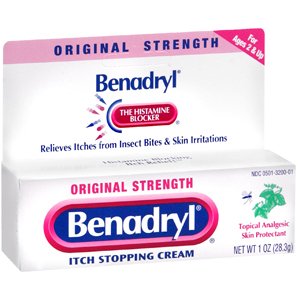
Most allergy sufferers are aware of Benadryl in the pill form, but did you know that Benadryl also comes in the form of cream? It temporarily relieves pain and itching associated with minor allergic reactions, insect bites, sunburn, and rashes due to poison ivy. It contains a histamine blocker which makes it the perfect choice to treat your allergy symptoms.
You can buy this product from any pharmacy without a prescription. Although this cream is considered safe for almost everyone, there are some side effects. As with any cream, it could make your rash worse. It might also make your skin sensitive to sunlight. Consult with your allergist if you experience any side effects to benadryl cream.
Caladryl Lotion
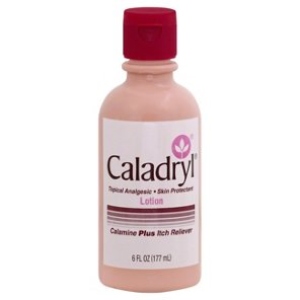
Caladryl lotion works by numbing the skin to block the feelings of pain and itching. It works best for stinging insect bites. It’s also a skin protectant. Use this lotion before and after you go outdoors for the best results.
Rare side effects include skin inflammation and burning sensations. If you are allergic to any ingredient in calamine, do not use this product. Caladryl lotion is also available over-the-counter, but notify your doctor before using.
Hydrocortisone Cream
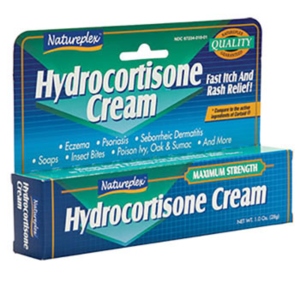
This mild corticosteroid is the most budget friendly. You can purchase it for as low $5. Hydrocortisone reduces swelling, itching, and redness due to contact dermatitis and eczema. It comes in maximum strength that is comparable to a prescribed cream.
Since hydrocortisone is a steroid, it should not be used long term. You should also be cautious when using this cream on your face as it can cause rosacea, acne and skin pigment changes. Use this cream only as directed by your doctor and stop using it soon as your symptoms subside.
Colloidal Oatmeal Cream
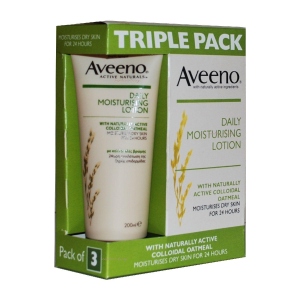
Colloidal oatmeal cream is a more natural solution. The type of oatmeal used in this cream is made from oats that have been ground into a very fine powder. It is used in many types of soaps and lotions and can also be added to your bath. Oatmeal cream helps reduce itching and inflammation. It works wonders on patients who suffer from psoriasis and eczema, but can also soothe your allergy related symptoms.
If you suffer from an oat allergy, you should not use this cream as it can cause a severe allergic reaction. If you are not sure if you’re allergic to oats, contact an allergist for a quick allergy test before using this product.
Aloe Vera Cream
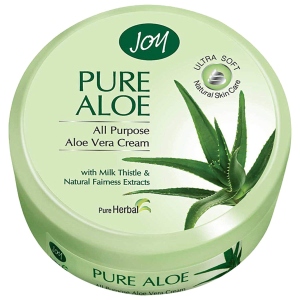
Aloe Vera Cream is another natural cream. Aloe vera has many skin benefits. It can treat sunburns, acne, and other skin conditions. It has been used for centuries to aid in skin treatments. Recent studies show that aloe also aids in speeding the healing process for wounds.
Do not use this product if you are allergic to aloe vera. Ask a doctor if aloe vera will work for you.
*Using these creams do not replace your visit to an allergist. You may need a stronger topical steroid to treat your symptoms.
Zymox Topical Cream For Pets
Did you know that your furry friend can experience the same symptoms you do? Their itchy and inflamed skin needs treatment as well. Zymox is a cream for your pet to help treat their symptoms. It contains hydrocortisone and aloe vera, so it provides the maximum soothing abilities. Ask your vet if this cream will work for your pet.
Alternatives To Creams
While antihistamine creams work well to relieve your symptoms, there are some alternatives that will also get the job done. If you want an all natural antihistamine, try chamomile. Chamomile has powerful anti-itching properties. You can brew chamomile tea, let it cool for a bit, pour it onto a washcloth, and then use it as a compress on the affected areas.
Ice will also help with itching and swelling. Hold an ice pack against the skin until your symptoms subside. Use ice if you have very sensitive skin and experience skin reactions often.
Meet The Physician Collaborator
Dr. Sima Patel is a doctor of osteopathic medicine. She is board certified by the American Board of Internal Medicine as well as the American Board of Allergy and Immunology. You can schedule an appointment with Dr. Patel by calling (212) 686-4448 or by visiting one of our seven locations throughout Manhattan and Queens.
